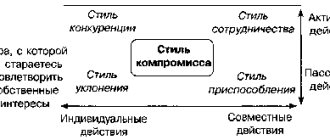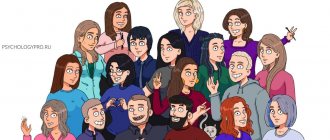Every year we are promised a cure for laziness. In anticipation of her, marketing is also arguing: under the banner of fighting “Oblomovism,” psychological brochures, dietary supplements, and even eleutherococcus are promoted. After all, the soil is fertile. Rarely today does a discussion about the fate of the world go by without complaints about the “infantile generation” that doesn’t want to do anything. Except sitting on your parents' necks, buried in your smartphone. Like, it’s just some kind of clinic!
What is abulia?
Definition of the concept
The term abulia is used in psychiatry to designate a variant of the pathology of the will.
Abulia, as a rule, is only a component of any pathological syndrome and mental illness in general. A person understands intellectually, for example, that he needs to complete a task or do an important thing, but he lacks the motivation and initiative to complete this act. Lack of motivation to perform an action, aspirations and desires are the main manifestations of a violation of the volitional sphere. When we say that a person is strong-willed, we mean such personality qualities as determination, independence, responsibility, and perseverance. Also, volitional qualities include such altered characteristics as stubbornness, suggestibility, indecisiveness, and inability to restrain one’s emotions.
Frequency of occurrence
In a doctor’s practice, the state of abulia is woven into the clinical picture of many not only mental, but also neurological diseases. Most often it can be found in schizophrenia, depressive disorders, organic brain lesions, and senile dementia.
The pathology of the will is widespread everywhere, regardless of gender, age, race, or social level. For objective reasons, it is not possible to determine the frequency of occurrence.
Classification of abulia
Will is a conscious and complex mental process that is aimed at achieving a goal and ultimately obtaining pleasure for a person. Thus, an act of will is planned and supported by a person’s motivation to overcome all obstacles, both external and internal. We always want something, desire something, strive for something. This does not happen because people always lack or lack something.
This is an instinct inherent in nature itself. It is necessary for the survival and continuation of the human race. Now, in conditions of market oversaturation with products, social stratification, and many other reasons, this instinct has undergone some changes. The vector of action is not aimed at protecting oneself or attacking for the sake of survival, but at the desire to obtain the benefits of civilization, comfort, and beyond wealth.
It is worth noting that the motives of behavior are divided into higher and lower. The lower (infantile and egoistic) are aimed at obtaining pleasure, physiologically, or benefit for themselves, to the detriment of other people. Higher (altruistic) – the desire to benefit society.
So, an act of will is a process. And a violation can occur at any stage of this process. The pathology of motivation at the initial stage can be represented by its strengthening, oppression or perversion.
Suppression of the volitional sphere includes anorexia, decreased sexual desire, inhibition of defensive reactions, hypobulia and abulia. Hypobulia is an initial condition characterized by a decrease in the volitional component in the personality structure. The extreme severity of hypobulia is called abulia, i.e. volitional impulses and motives are completely absent.
Parabulia refers to a perversion of the volitional component (obsessive, impulsive and compulsive desires). Hyperbulia occurs when a volitional stimulus increases (bulimia, hypersexuality, etc.).
Apatico-abulsic syndrome is a complex of symptoms of the pathology of the will. Apathy in some ways can be correlated with hypobulia, while abulia is a more serious symptom. There is also apato-akinetic syndrome, which is accompanied by immobility of a person.
PsyAndNeuro.ru
The last decade has seen a resurgence of interest in abulia, driven in part by evidence that this symptom causes significant impairment in real-life functioning and is a predictor of poor functional outcome in people with schizophrenia.
Abulia is currently understood as a decrease in the initiation and maintenance of goal-directed activities. There is no agreement on the degree of overlap between terms such as abulia, decreased drive, amotivation, and apathy, and they are often considered interchangeable. There is also widespread debate about whether the definition and assessment of abulia should rely on the observations of an expert or the patient's caregivers, or on the patient's self-report of his or her participation in various activities or on the patient's expressed interest in participating in an activity. .
Like antisociality, abulia is not recommended to be assessed solely on the basis of observed behavior. Indeed, the inability to initiate and maintain goal-directed activities may be due to several factors that are not related to negative symptoms (eg, paranoid beliefs, depression, or lack of opportunity). The assessment should always include desire and interest in purposeful activities for the patient.
Clinical rating scales for abulia involve retrospective assessment that often combines more than one source of information whose consistency has almost never been tested. In the SANS, apathy/abulia is assessed using three behavior-based items: grooming and personal hygiene, instability at work/school, and physical anergy. In the PANSS, only one item actually refers to abulia, i.e. emotional withdrawal, assessed based on caregivers' report of the patient's interest and emotional involvement in daily life. The BNSS includes separate items to assess the internal experience of abulia and its behavioral manifestations; both items include motivation for work/study, leisure activities, self-care, and total time spent in inactivity. In the CAINS, abulia is assessed using two items on the Motivation and Enjoyment scale: motivation for work and school activities and motivation for leisure activities. Internal feelings and behavior are assessed within each individual item, except for self-care. The strength of correlations between BNSS and CAINS items ranges from moderate to high, but is inferior to the correlations for items assessing reduced affect and alogia.
According to the current concept, motivation is a multifaceted construct that includes positive experiences, reward prediction, and other elements such as reinforcement evaluation, effort evaluation, contingency encoding of action outcome, and decision making. This multifactorial construct closely resembles the Research Domains Criteria (RDoC) conceptualization of motivation in the positive valence framework and has been the subject of several experimental designs in recent decades, which will be briefly discussed next.
The hypothesis that disruptions in reinforcement negatively impact motivational aspects of the negative symptoms of schizophrenia has received much attention. It has been found that many people with schizophrenia experience pleasure in the same way as healthy people when engaging in pleasurable activities during daily life or when exposed to a pleasurable stimulus; however, they are less likely to engage in pleasure-seeking behavior due to their inability to anticipate future rewards. Research on reward anticipation in schizophrenia has focused primarily on the neurobiological underpinnings of this process and has systematically reported impairments in reward prediction mechanisms mediated by striatal nuclei.
The ability to predict reward requires a learning process. In this regard, several studies have focused on reward learning in schizophrenia and have reported difficulties in cases where rapid learning of reward cues is required and changes in outcome and feedback occur (e.g., a previously rewarded response is followed by punishment), in whereas no difference is observed when people learn through repeated repetition (routine/procedural learning).
The possibility was also considered that motivational deficits include the ability to “represent value information”, i.e. relate the hedonic properties of a stimulus to an individual's internal state (e.g., food is more valuable to a hungry person), the delay between stimulus and reward, and the need to change a response under contingency conditions (a previously rewarded stimulus that becomes associated with punishment). There is evidence that the ventromedial prefrontal cortex is involved in the representation of goal salience.
Another approach to understanding the relationship between reward anticipation and abulia assesses the amount of effort a person is willing to expend for a given reward. Recent attention has focused on experimental paradigms that measure cognitive, perceptual, and physical effort. Initial results from studies examining the psychometric properties of various measures appear promising. Tasks require gradually increasing effort, cognitive or physical, in order to obtain material rewards; the level of effort increases from attempt to attempt to find the person’s “control point”, i.e. the point at which the subject is no longer willing to exert effort to obtain the offered reward. People with schizophrenia tend to have cutpoint scores lower than or equal to those of the comparison group, and a low cutoff score is significantly associated with greater severity of motivational deficits. Brain regions that may be involved in calculating the expected cost of effort are the dorsomedial prefrontal cortex and the insular cortex.
The hypothesis that executive function deficits contribute to difficulties in engaging in goal-directed activities has also been supported by the results of some studies. However, conflicting results have been obtained, and more precise assessment of both areas will help identify the reasons for the discrepancies.
Despite the interest and progress generated by the experimental models described, it is clear that the interaction of neural systems involved in motivation is a complex process, and we are likely only beginning to comprehend this complexity. In addition to the neural level, also the level of psychopathology needs further clarification; in particular, the assessment process should include different tools and sources of information, and possible discrepancies should be highlighted. In addition, the possibility that personalized rewards (eg, making monetary rewards proportional to the subject's income) may have an impact on patient-control group differences should be considered, and sources of secondary abulia should also be carefully considered and, if possible, eliminated.
Translation into Russian was organized by the Council of Young Scientists of the Russian Society of Psychiatrists with the support of the World Psychiatric Association.
You can download the full issue in Russian, from which this article is taken, by following the link
Source: Stephen R. Marder, Silvana Galderisi. The current conceptualization of negative symptoms in schizophrenia. World Psychiatry. Feb 2021; 16(1): 14–24.
Translation: Pikirenya L.Yu., Pikirenya V.I., Shunenkov D.A.
Editing: Ph.D. Fedotov I.A.
Why does abulia occur?
Main reasons
The main causes of lack of will include such serious conditions as head injuries, cerebrovascular accidents, and neuroinfections (meningitis, encephalitis). Neurological diseases (Pick's disease, Huntington's chorea, Parkinson's disease) can also cause abulia, because The entire brain is diffusely affected.
In psychiatry, there are many etiological factors: schizophrenia, depression, dementia, profound mental retardation, neurotic disorders. For the most part, the heredity of mental disorders is also important.
Changes occurring in the body
Abulia can be caused by decreased blood supply to the brain, as well as morphological damage to structures such as the frontal lobes, corpus callosum, basal ganglia and anterior cingulate cortex. These structures are responsible for carrying out purposeful action.
Previously (before 1961), in the treatment of schizophrenia in psychiatric hospitals, a surgical method of treating this disease, namely lobotomy, was widely used. A sharp blade destroyed precisely these zones (the frontal lobes and the isthmus between them). At the moment, this method is not used due to its inhumanity. The science fiction film Sucker Punch talks about this very milestone in history. The main character's fantasies are closely intertwined with real events taking place in a psychiatric clinic.
Etiology and pathogenesis
Most often, abulia affects people with weak mental health, prone to somatoform disorders - conditions in which various complaints are observed without an existing cause or disease.
Abulic syndrome often develops against the background of impaired blood circulation in the brain, especially in the frontal part of the right hemisphere. In most cases, this occurs as a result of injury to the area or the presence of a serious illness, which causes inactivity and inertia.
The pathogenesis consists of a decrease in dopaminergic neurotransmission of the frontal lobes of the brain, which are responsible for the directed actions of the body, initiative, performance of various functions and overcoming difficulties.
The main danger of abulia is the destruction of a person as an individual. This is determined by the disappearance of motivation and desire to achieve set goals.
Abulia, which develops in childhood, and its hereditary form, which occurs from birth, pose a particular threat. It manifests itself as calmness, weakness of will, laziness, apathy and is regarded by parents as a character trait of the child. In this case, there is no timely detection of the disease and its treatment.
Provoking factors
There are many causes of abulia. They can be hereditary or develop against the background of an unhealthy lifestyle. All of them are divided into psychological and physiological:
| Psychological | Physiological |
| Stress | Traumatic brain injury |
| circular psychosis (manic-depressive psychosis) - a disease characterized by alternating mood disorders with periods of mental health | brain infection - encephalitis, meningitis |
| hereditary predisposition | stroke |
| oligophrenia - congenital mental retardation | neoplasms in the brain |
| borderline mental states (hysteria, psychoneurosis) | addiction |
| depression | alcoholism |
| dementia | hypoxia |
| overprotection of a child by parents | Parkinson's disease |
| schizophrenia | Pick's disease |
| Alzheimer's disease | |
| Huntington's disease |
Abulia is often one of the signs of apathy, and it can be confused with weakness of will.
What symptoms suggest abulia in a person?
It is difficult to identify abulia in the earliest stages of its development. The speed of the psychopathological process depends on the disease that caused abulia.
You need to sound the alarm if you notice that a person:
- became less emotional;
- finds words with difficulty, takes a long time to answer questions asked;
- stopped gesticulating and became stiff;
- has difficulty starting a new business and/or does not complete it;
- became withdrawn, stopped communicating with friends and family;
- lost his former hobbies;
- neglects personal hygiene (does not wash, does not comb, does not shave, does not wash clothes, etc.).
It is necessary to consult a specialist to exclude abulic syndrome as part of the underlying psychoneurological disease.
Diagnosis of the condition
Only a competent certified specialist - a psychiatrist - can identify the presence of hypobulia and abulia. The doctor talks in detail with the patient and his relatives, gets acquainted with medical documentation and clinical studies. It is important to distinguish the pathology of the will from simple laziness, which is treated through occupational therapy and increased motivation.
For many people, the condition of abulia is extremely difficult to understand. How is it that a young and outwardly strong and healthy young man cannot do anything, leave the house? Unfortunately, this is a feature of many abulia conditions. The inability to engage in purposeful activities and weakness of will lead to real stigmatization and disability in the end.
Abulia is a mandatory symptom of schizophrenia, but abulia may not appear immediately, but as the personality defect increases (from a year to decades). The so-called negative symptoms of schizophrenia lead to disruption of the social and work adaptation of patients; they stop taking care of themselves, become isolated and have difficulty leaving the house.
Clinical examinations such as MRI and CT will help differentiate from other diseases. With their help, the doctor will be able to see the foci of brain damage in a particular pathological condition.
Symptoms
The main signs of the disease are:
- Inhibition in all areas of activity - conversation, thinking, movements.
- Social isolation and difficulty connecting with people.
- Neglect of hygiene rules, sloppiness.
- Difficulty making decisions.
- Motor and speech passivity.
- Loss of interest in communicating with other people and doing favorite activities.
- Spontaneity of action.
- Impaired coordination of movements and their stiffness.
- Indifference to everything around.
- Lack of feelings and emotions.
- Pessimism.
- Unreasonable fatigue.
- Decreased appetite.
- Sleep disturbance, insomnia.
- Memory impairment.
- Lack of facial expressions.
- Inability to make independent decisions.
In psychology, abulia is clearly differentiated from weakness of will. The difference is that abulia is a pathological personality defect, and not a character trait, which is weakness of will.
Approaches to the treatment of abulia
There is no treatment for abulia as a separate symptom of the disease. It is important to carry out treatment comprehensively and individually. The patient’s age, his physical condition, the duration of the mental disorder and its nature are always taken into account. Drug therapy is usually combined with psychotherapy. You need to understand that treatment should be carried out long-term and continuously, only under the supervision of the attending physician.
Medicinal effects
Abulia in schizophrenia is treated with antipsychotics. There is a group of atypical antipsychotics that appeared relatively recently. These drugs can prevent the development of negative symptoms in schizophrenia, maintain social and labor status, and increase the patient’s rehabilitation potential.
As a rule, antipsychotics in this group are highly effective and have minimal side effects. This group includes drugs such as Olanzapine, Quetiapine, Risperidone, Invega, Clopixol, Alimemazine. The dosage is selected by the doctor based on the clinical picture of the disease.
Depressive disorders can also be accompanied by the development of abulia, especially in severe cases. These conditions are difficult to treat; treatment with antidepressants should be carried out for a long time - from 6 months. Preference is given to the group of selective serotonin reuptake inhibitors (SSRIs): Sertraline, Paroxetine, Escitalopram, etc.
Psychotherapy
Any option and method of psychotherapy is used only after the necessary correction of the condition with medications. If we are talking about simple laziness, the question is only about increasing motivation to achieve desired goals, learning to plan work and your leisure time, and taking full responsibility for failure to complete tasks. Self-discipline and occupational therapy, primarily on oneself, bring positive results.
For abulia caused by a mental disorder, the method of work is selected individually by the psychotherapist. Cognitive behavioral, family and group therapies are well suited for this purpose. It is very important for depressed people to feel supported and understood by other people.
In the family, it is necessary to form the correct attitude of all its members towards this type of mental disorder, to create a favorable and calm environment for the patient. Psychotherapy is usually carried out throughout the year in courses of 10-15 sessions.
Treatment
To get rid of abulia, it is necessary to treat the underlying disease. Treatment is comprehensive, including the use of medications and psychological support.
Depending on the underlying pathology, appropriate therapy is prescribed:
| Pathology | Treatment |
| Schizophrenia | Atypical antipsychotics (amisulpride, risperidone, olanzapine, clozapine and others) |
| Depression | Antidepressants (Azafen, Zoloft, Citalon, Heptor and others) |
| Apato-abulic syndrome | Frenolon |
| Apathetic-abulic syndrome in schizophrenia | Triftazin, piracetam |
| Suppression of volitional impulses | Sulpiride |
Additionally recommended:
- physiotherapy - helps improve the performance of the nervous system;
- phototherapy;
- medicinal baths;
- swimming.
Psychological help:
- Finding a hobby or interesting activity. It is aimed at overcoming the barrier of loss of interest.
- Involvement in social activities helps relieve the patient from the feeling of uselessness.
- Overcoming pity. Often patients harbor this feeling within themselves; sympathy and compassion only worsens their condition.
Prognosis of the condition, possible complications
The prognosis is formed solely on the basis of the nosology of a mental or neurological disorder. In schizophrenia, for example, abulia can develop and remain a persistent and permanent symptom a year after the onset of the disease. Therefore, it is so important to begin treating schizophrenia in a timely manner with adequate dosages of antipsychotics in order to prevent the collapse and regression of the personality.
Abulia in depression can be complicated in severe cases by catatonia and akinetic disorders in the form of stiffness and mutism. A person may lie immobilized for a long time and refuse to eat or drink. This can disrupt the water-electrolyte balance of the body and lead to death due to thrombosis or cardiac arrest.
Violations of the intellect in the form of its underdevelopment in mental retardation or decay in dementia and Pick's disease are often accompanied by disorders of the volitional sphere. Such patients find it difficult to care for themselves, they feel helpless and worthless, and require control from relatives. Patients become a heavy burden on the shoulders of their relatives.
It is important to promptly seek medical help when the very first signs of memory impairment or difficulties in everyday life appear. Properly prescribed treatment will help prolong the years of active aging and slow down the processes of personality degradation.
In severe cases, abulia as part of a mental illness leads to disruption of work and social adaptation. A person loses his job, his previous social circle, stops taking care of himself, withdraws, and stops leaving the house. This state of affairs can lead to disability.
Prevention
If you identify symptoms similar to clinical abulia, which have been present for at least 2 weeks, you should immediately contact a psychoneurological clinic at your place of residence. Competent specialists, psychiatrists, will help you understand the situation and disturbing symptoms, and prescribe treatment if necessary.
Preventative measures for abulia include:
- organization of proper sleep and wakefulness, work and rest;
- planning tasks, setting achievable and realistic goals;
- timely observation and treatment of concomitant diseases;
- creating persistent interests and hobbies, visiting clubs and sections.
Diagnostics
There is still debate about whether abulia is a separate disease. Currently, it is listed as a consequence of psychological or neurological pathology.
Defect determination methods:
- Anamnesis collection and interview by a psychologist or psychiatrist.
- Testing.
- Observe the patient for several days to determine the main symptoms.
- Differential diagnosis to help distinguish abulia from weakness, laziness and apathy.
- Laboratory blood test.
- Instrumental diagnostics of the brain, determining the presence of organ damage:
- MRI (magnetic resonance imaging).
- Ultrasound (ultrasound examination).
- EEG (electroencephalography).
- CT (computed tomography).










